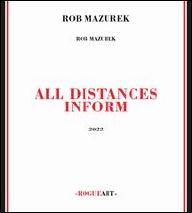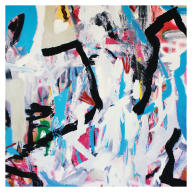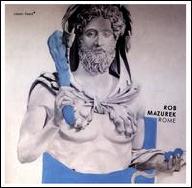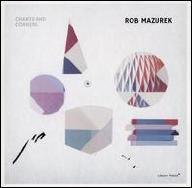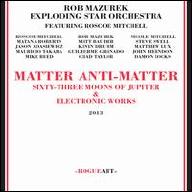Born in 1965 in Jersey City, New Jersey, Mazurek moved with his family to the Chicago area as a preteen and began playing cornet in his school band at the age of ten. After switching briefly to trumpet, he eventually settled on the smaller horn. Upon graduating from high school, the young musician attended the Bloom School of Jazz in Chicago. He got his start as a performer in the city playing with pianist Kenny Prince and drummer Yoron Israel. Early influences came from the hard bop nucleus of Blue Note Records (particularly the trumpet playing of Lee Morgan, Kenny Dorham, and Freddie Hubbard). It was in this mold that Mazurek shaped his first group, a quartet with drummer George Fludas, bassist John Webber, and pianist Randolph Tressler. In 1993, Mazurek booked an engagement at Edinburgh's Tron Tavern & Ceilidh House for the entire length of the country's Fringe Festival. Though the music was fairly traditional, the performances were a success, and the following year the group was offered a deal with Scotland's Hep label. The quartet's promise was certified with Man Facing East in 1994 and Badlands in 1995.
Mazurek was hearing a new sound, however. His creative impulses were being sparked by the music of Ornette Coleman and his cornet-wielding sparring partner from the late '50s, Don Cherry, as well as the Art Ensemble of Chicago. The list would quickly grow to include the free playing of Henry Threadgill, Bill Dixon, and Leo Smith, and by the time of 1996's Green Blue, Mazurek was beginning to see the limitations of his quartet. That year he established the Chicago Underground, a Sunday afternoon workshop at a local bar, the Green Mill. The first person he invited to his new musical high-wire act was guitarist Jeff Parker. The jam sessions quickly attracted a group of regulars who included bassist Noel Kupersmith and drummer Chad Taylor, and Mazurek found that he had a core ensemble. It was this new crew -- completed by trombonist Sara Smith and billed as the Chicago Underground Orchestra -- that recorded Playground for Bob Koester's Delmark in 1998. The partnership automatically linked Mazurek's group with a rich tradition of Chicago jazz, as Delmark had championed a number of artists from the city's Association for the Advancement of Creative Musicians.
Mazurek's group would spawn a number of spin-offs including a Duo (with Taylor), a Trio (with Kupersmith), and a Quartet (with Parker), all of which wore the Chicago Underground banner. Parker had moved into the loft of Chicago's Tortoise a few years earlier and quickly became a full-time member. Two musical worlds -- fringe jazz and fringe rock -- met, and Mazurek found himself exposed to an entirely new realm of sonic possibilities. In subsequent years, he made numerous extracurricular appearances, lending his cornet to Tortoise's TNT, Gastr del Sol's Camoufleur, Stereolab's Cobra and Phases Group, and Sam Prekop's solo debut. This musical cross-fertilization resulted in the creation of Isotope 217 in 1997. A disorienting mix of jazz flourishes, muscular funk, hip-hop reductions, and minimalist electronica, the group was a collaboration between Chicago Underground members (Mazurek, Parker, and Smith), veteran Chicago bassist Matt Lux, and Tortoise's Dan Bitney and John Herndon. The sextet released its debut, The Unstable Molecule, in 1998, followed by Utonian Automatic in 1999 and Who Stole the I Walkman? in 2000.
Meanwhile, the music emanating from the Chicago Underground was approaching the realm of pure sound on albums like Synesthesia and Possible Cube. Mazurek had discovered the music of Morton Feldman and Vladimir Ussachevsky, as well as visual artists like Mark Rothko, all of whom seemed to find a way into his music. As the century drew to a close, he was hard at work developing laptop-constructed musique concrète for his Orton Socket project. Mazurek subsequently moved from the United States to São Paulo, Brazil and expanded his international perspective, touring and recording with the São Paulo Underground, the Exploding Star Orchestra, and the improvisational trio Tigersmilk. In addition, the Exploding Star Orchestra appeared at the Chicago Jazz Festival with vanguard jazz legend Bill Dixon. Together they premiered one new extended composition by each man. It was the latter's first large-scale experiment with a video score. In 2008, the collaboration continued in the recording studio, resulting in Bill Dixon with Exploding Star Orchestra on Thrill Jockey. It was Dixon's final recording.
In 2010, Mazurek recorded Boca Negra with the Chicago Underground Duo, Stars Have Eyes with the Exploding Star Orchestra (both on Thrill Jockey), and a solo effort entitled Calma Gente. He debuted his Starlicker group on Double Demon from Delmark. The band included vibraphonist Jason Adasiewicz and drummer John Herndon. The São Paulo Underground released its third offering, Tres Cabeças Loucuras, on Cuneiform. Mazurek toured behind both. Despite other projects, the Chicago Underground Duo remained at the top of his priority list. Its Age of Energy was released in the spring of 2012. In January of 2013, Cuneiform released Skull Sessions by the Rob Mazurek Octet, which featured members of Starlicker, the São Paulo Underground, and noted Chicago flutist Nicole Mitchell among its personnel. In April, The Space Between, a collaborative project between his Exploding Star Electro-Acoustic Ensemble and videographer Marianne M. Kim, was released by Delmark. Mazurek returned with a Chicago Underground Duo album the following year titled Locus, on Northern Spy. Following the passing of Mazurek's mother, he recorded the deeply moving Return the Tides with Black Cube SP (an extended lineup of São Paulo Underground). Cuneiform released it in 2014. Galactic Parables, Vol. 1, a concert set, appeared a year later.
France's Rogue Art released two recordings by Mazurek's ensembles. First, the Exploding Star Orchestra's Matter Anti-Matter (with featured soloist Roscoe Mitchell), followed by Some Jellyfish Live Forever, a duo with guitarist Jeff Parker. In the spring of 2016, International Anthem released Alien Flower Sutra, a collaborative song cycle with the Cairo Gang's Emmett Kelly. It was followed in October by Cantos Invisiveis, the fifth album from the São Paulo Underground. 2017's Rome on Clean Feed and Mother Ode on Corbett vs. Dempsey were solo offerings on which Mazurek played all instruments. His final release that year, Chants Corners (also on Clean Feed), found him fronting an electro-acoustic quintet. The following year, he and Christophe Rocher co-led the 16-piece 21st century avant-jazz band Third Coast Ensemble (that included Tomeka Reid, Mitchell, and Parker) for Wrecks, released by Rogue Art. A concert album, Age of Chaos, arrived in 2019 and captured Mazurek's performance from the previous year, playing the piccolo trumpet alongside tenor saxophonist Cene Resnik at the 23rd Jazz Cerkno Festival in Slovenia.
In the fall of 2020, International Anthem released Dimensional Stardust. Written for Mazurek's Exploding Star Orchestra, it was recorded by the composer and conductor with a host of his own players and IA stalwarts including vocalist Damon Locks, (Black Monument Ensemble), guitarist Jeff Parker, vibraphonist Joel Ross, flutist Nicole Mitchell, cellist Tomeka Reid, and drummer John Herndon. ~ Nathan Bush, Rovi



